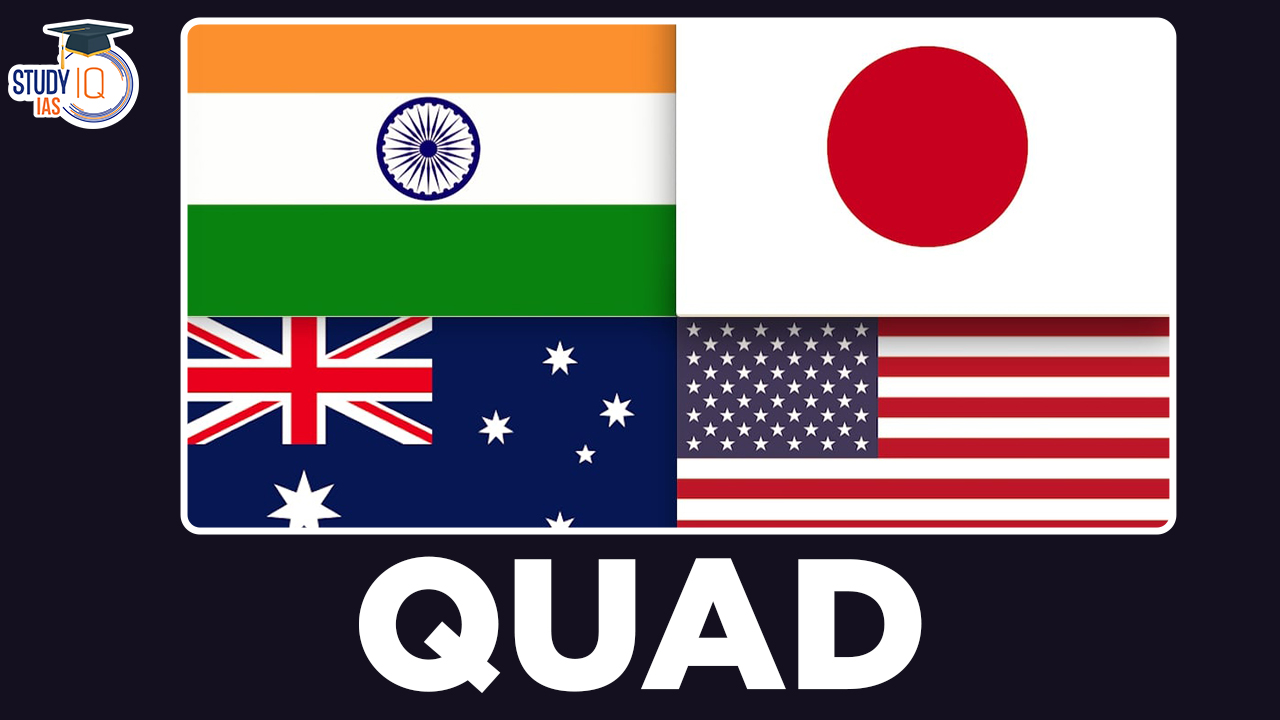Table of Contents
The Quadrilateral Security Dialogue (QUAD) is an informal strategic forum consisting of four key democracies: India, the United States, Japan, and Australia. Established to promote a free, open, and inclusive Indo-Pacific region, the QUAD aims to enhance cooperation in areas ranging from maritime security to technology and climate change. In recent years, QUAD has gained prominence as a geopolitical counterbalance to China’s increasing assertiveness in the Indo-Pacific.
What is QUAD?
The Quadrilateral Security Dialogue (QUAD) is an informal strategic forum comprising four democratic countries—India, the United States, Japan, and Australia. Originally formed to strengthen maritime cooperation, QUAD has evolved into a platform that addresses security, economic, health, and technological challenges in the Indo-Pacific region.
QUAD Countries List
Here are the four member countries of QUAD:
| Country | Region | Strategic Contribution |
|---|---|---|
| India | South Asia | Maritime security, pharmaceutical leadership, counterbalance to China |
| USA | North America | Military might, global diplomacy, technological dominance |
| Japan | East Asia | Economic power, regional influence in East Asia |
| Australia | Oceania | Indo-Pacific diplomacy, maritime strength, strong US ally |
Evolution of QUAD
- The Quad’s establishment can be traced back to the cooperation between these countries during Exercise Malabar and the joint relief operations conducted after the 2004 Indian Ocean tsunami.
- Initially it was formed to address concerns over China’s growing economic and military power.
- India was cautious about China’s response, particularly regarding its pursuit of a Nuclear Suppliers’ Group waiver.
- Additionally, there were doubts about the effectiveness of a quadrilateral arrangement, as India already had trilateral partnerships with Japan and the U.S., as well as Australia and Japan.
- However, in 2017, faced with renewed challenges posed by China’s rise, the four countries revived the Quad, leading to the formation of “Quad 2.0.” The reinvigorated Quad is the result of substantial groundwork undertaken between 2017 and 2021.
Objectives
The aim of the Quadrilateral Security Dialogue (Quad) is to promote cooperation and coordination among its member countries—United States, Japan, Australia, and India—on various strategic and security-related issues in the Indo-Pacific region.
The Quad’s objectives include
- Ensuring a Free and Open Indo-Pacific: The Quad seeks to maintain a rules-based international order, freedom of navigation, and respect for international law in the Indo-Pacific region. It aims to promote the principles of openness, inclusivity, transparency, and respect for sovereignty.
- Enhancing Regional Security: The Quad aims to strengthen regional security by addressing common challenges such as maritime security, counterterrorism, non-proliferation, and cybersecurity threats. It seeks to improve coordination among member countries’ defence and security establishments.
- Promoting Economic Cooperation: The Quad encourages economic development and connectivity in the Indo-Pacific region. It aims to promote infrastructure development, trade, investment, and technological collaboration to foster economic growth and prosperity.
- Humanitarian and Disaster Response: The Quad aims to enhance cooperation in responding to natural disasters, humanitarian crises, and emergencies. Member countries collaborate to deliver disaster relief, enhance disaster management capabilities, and coordinate humanitarian assistance efforts.
- Consultation and Dialogue: The Quad provides a platform for regular consultation and dialogue among member countries. It facilitates exchanges of views, information sharing, and coordination on regional issues of common interest.
Significance of QUAD for India
- Counterbalancing China: India sees the Quad as an opportunity to offer alternatives to China’s Belt and Road Initiative, which challenges India’s territorial sovereignty and regional prominence. Through the Quad, India can collaborate with other countries to maintain a rules-based order and balance China’s growing influence in the Indo-Pacific region.
- Economic opportunities: Enhanced economic cooperation within the Quad can lead to increased trade, investment, and technological collaboration for India. This can contribute to India’s economic growth and provide opportunities for diversifying its trade partners.
- Regional security: The Quad’s focus on maritime security and counterterrorism aligns with India’s security concerns as a maritime nation. Collaboration within the Quad can bolster India’s capabilities and contribute to regional security, ensuring freedom of navigation and countering common threats in the Indo-Pacific.
- Infrastructure development: The Quad’s emphasis on infrastructure development resonates with India’s own initiatives such as the “Act East” policy and the Indo-Pacific Oceans Initiative. Enhanced cooperation in infrastructure projects can improve connectivity, trade facilitation, and economic integration, benefiting India and the region as a whole.
- Advancing India’s interests in the Indo-Pacific: The Quad provides India with a powerful platform to advance its interests in the Indo-Pacific. It aligns with India’s Act East policy and enables deeper engagement with countries in the region, including through initiatives like the Asia Africa Growth Corridor.
- Evolving foreign policy strategy: The Quad allows India to align with like-minded countries without entering into a formal alliance or undermining its relationships with countries outside the Quad. This flexible approach reflects India’s evolving foreign policy strategy.
- Strengthening defence capabilities: Collaboration within the Quad can help India overcome limitations in terms of finances, naval capacity, military reconnaissance, and technological and surveillance capabilities. It provides avenues for joint exercises, information sharing, and capacity-building efforts.
Challenges facing Quad
The Quad encounters various challenges that require attention to ensure its effectiveness and long-term success. These challenges can be summarized as follows:
- Impact on India’s other engagements: China argues that India’s growing proximity to the Quad, especially the United States, has strained its relations with China and Russia while hindering progress in forums like BRICS and the Shanghai Cooperation Organization. India must effectively manage its relationships with other countries to ensure that its participation in the Quad does not hinder its other important bilateral and multilateral engagements.
- Ambiguous objectives: Clear communication of the Quad’s objectives and focus areas is essential to avoid perceptions of it being solely an anti-China alliance. Unclear objectives limit its potential in addressing important global issues such as climate change cooperation and vaccine diplomacy. The Quad should actively engage in addressing a wider range of global challenges beyond security concerns.
- Pending issues:
- Climate change: While India has collaborated with Quad members on initiatives like the International Solar Alliance and the Paris Agreement, it has not committed to targets like Net Zero emissions or a deadline for phasing out coal. Resolving differences on climate change and achieving a shared approach are crucial for the Quad’s effectiveness.
- Cross-border data flows: India’s stance on cross-border data flows differs from other Quad countries, potentially impacting digital cooperation, technology collaboration, and cybersecurity. Harmonizing approaches to data governance is necessary to unlock the full potential of Quad collaboration.
- Inconsistent signals from the United States: The recent announcement of the AUKUS trilateral defence partnership between the United States, Australia, and the UK, made without prior consultation with Quad partners, has caused confusion among allies. The Quad members must address such discrepancies and ensure clear communication and coordination to maintain trust and unity within the group.
- Diverging perspectives on risks and costs: Each Quad member has distinct considerations regarding the potential risks and costs involved in countering China’s influence. Factors such as direct territorial disputes with China and varying perceptions of the risks of retaliation need to be managed to maintain a cohesive approach. Understanding and accommodating each nation’s strategic culture will be vital in addressing these divergences.
- China’s influence: China maintains strong economic ties with Quad members, particularly Australia, which it could exploit to exert coercion or influence. India must navigate these dynamics carefully to safeguard its interests and protect its sovereignty. Effectively addressing China’s influence poses a significant challenge for the Quad.
To overcome these challenges, the Quad members should prioritize open dialogue, transparent communication, and the cultivation of trust among themselves. Managing relationships with other countries and regional forums is also crucial for ensuring a balanced and comprehensive approach to regional and global affairs.
Way Forward
The following steps should be taken to enhance the QUAD cooperation:
- Collective action: The Quad nations should emphasize collective security to safeguard the freedom and security of member nations. By working together, they can effectively address common challenges and threats in the Indo-Pacific region.
- Clear vision: It is crucial for the Quad nations to articulate their Indo-Pacific Vision within a comprehensive framework that encompasses economic and security interests. This clear vision will not only benefit the member nations but also reassure other countries in the region about the positive impact of the Quad’s presence.
- Expansion of the Quad: Considering India’s numerous partnerships in the Indo-Pacific, efforts should be made to invite countries like Indonesia and Singapore to join the Quad in the future. Expanding the Quad will enhance its collective capabilities and broaden its reach, strengthening its effectiveness and influence in the region.
- Development of a maritime doctrine: India, in particular, should develop a comprehensive vision for the Indo-Pacific that addresses current and future maritime challenges. This doctrine should involve the consolidation of military and non-military tools, strategic engagement with partners, and a proactive approach to shaping the region’s security and stability.
By implementing these steps, the Quad can strengthen its cooperation, enhance regional security, and effectively address the evolving challenges and opportunities in the Indo-Pacific.


 UNESCO Global Network of Learning Cities...
UNESCO Global Network of Learning Cities...
 National Livestock Mission (NLM): Object...
National Livestock Mission (NLM): Object...

























